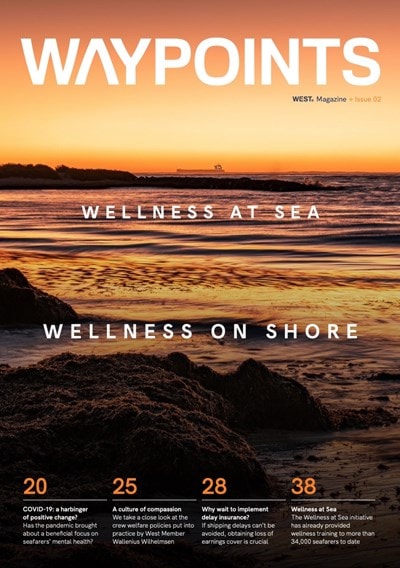COVID-19: A Harbinger of Positive Change for Shipowners and Seafarers?
The pandemic has been disastrous for seafarers: but the increased psychological focus on their mental wellbeing might cue improvements that benefit everyone.
The colossal impact of the COVID-19 pandemic has fundamentally altered many things in society, from our perception of the world and each other to the way we live, work and communicate. It has also highlighted the importance of how the seafaring community functions in the world economy and accentuated the need to safeguard crews’ mental health.
The global dependency on the shipping industry was brought into sharp focus when supermarket shelves started emptying of items. An estimated 90% of world trade is carried by sea, and the potential and actual shortages of some goods made shoppers appreciate how pivotal supply chains are to our everyday lives. This in turn highlighted an appreciation of the mental and physical strain endured by seafarers, having to keep freight moving in the face of stringent lockdown restrictions, legally obliged in many cases to remain on their vessels for months beyond their contracted time.
As we shall see, many organisations and charities have been determinedly placing seafarers’ mental health front and centre for several years. Commendably, numerous shipowners had already taken this on board well before the pandemic; but the latter event has forced others within the maritime industry to address the mental welfare of vessel crews as a matter of urgency.
Thankfully, science-based mental health initiatives which began in the wake of the Covid outbreak can be used to point the industry towards a more productive future. The hope is that positive psychology can bring about a significant improvement in the working lives and mental wellbeing of crews, with a happier, safer, and consequently more efficient workforce. This outcome may sound somewhat idealistic, but an examination of the most common crew claims received by P&I Clubs reveals a recurrent pattern of issues which could be addressed quite rapidly with the right tools.
Thankfully, science- based mental health initiatives which began in the wake of the Covid outbreak can be used to point the industry towards a more productive future
Common thread
The Clubs report that approximately one- third of all claims they see pertain to crew injury and illness. Heart attacks, strokes and respiratory illnesses crop up often, with work-related stress regularly cited as a contributory factor. Chronic fatigue is another major contributing factor which, combined with stress, prevents crew from thinking straight and may lead to horrific accidents. With their attention wavering, carelessness and calamities are inevitable.
With stress as a common thread, it’s hardly surprising that mental health problems arise, with incidences of suicide still increasing.
A 2019 study by Yale University, based
upon 1,572 seafarers representative of crews around the world, indicated that 25% of seafarers suffer from depression. (See here) The International Association for Suicide Prevention suggests that depressed people are 20 times more likely to commit suicide than those without depression. (See here) Categorical data is difficult to obtain for seafarer suicides, but The Sailors Society’s Wellness at Sea programme estimates that approximately 6% of deaths at sea are attributable to suicide.
More than 85% of accidents at sea are the result of human error, in many cases stemming from hard-wired fight-or-flight responses in life-threatening situations
Charities such as The Sailors’ Society and ISWAN (the International Seafarers’ Welfare and Assistance Network) provide advice, information and adaptive training solutions to engender proactive onboard mental health regimes, taking cultural and religious differences into consideration.
The post-COVID world and the human brain
The fact that mental health policies advocated by seafarers’ charities and unions have seen a marked uptake among shipping companies in recent months is highly encouraging; but the challenge may be maintaining this investment in a post-COVID world. Acknowledging the crucial importance of crews’ mental health is the first step towards initiating a healthier working and living environment on board. However, equally important is acknowledging human mental behaviour at work. More than 85% of accidents at sea are the result of human error, in many cases stemming from hard-wired fight-or-flight responses in life- threatening situations (for example, rushing to assist colleagues in an enclosed space without first donning appropriate safety equipment). Therefore, an understanding of innate human behaviour will be key to devising more effective training programs.
With some jobs, no amount of training will ever overcome this hard-wiring. Instinctive, pre-rational modes of human behaviour are an immutable scientific fact, and in many instances will override ‘hard skills’ training (ie, a fundamental nuts-and-bolts demonstration of how to carry out tasks). With this in mind, it may be better to channel money and resources into finding new and more effective methods to get the job done which take into account these hard-wired psychological impulses.
Conversely, studies have shown that prolonged anxiety can cause crews to stop listening and essentially shut down
At a management level, just as fundamental as providing crews with suitable conditions for rest and sleep will be the development of ‘soft skills.’ These are non-technical skills which relate to how one works, for example how one interacts with colleagues, solves problems and manages one’s time. These are critical skills that form the foundation of working to one’s maximum capacity. Training in soft skills includes empathetic techniques which encourage regular, harmonious, two-way interaction with crew members.
Training of this nature is designed to reduce stress hormones and boost oxytocin, a hormone which engenders trust and team bonding. This in turn enables personnel to take in information more effectively. Conversely, studies have shown that prolonged anxiety can cause crews to stop listening and essentially shut down. The demonstrable link between emotions and performance is highlighted in research papers such as a 2015 IISTE (International Institute for Science, Technology & Education) analysis, which notes that ‘an employee’s emotions and overall temperament have a significant impact on his job performance, decision-making skills, team spirit, leadership, turnover and job satisfaction (JM George and AP Brief, 2006).’
